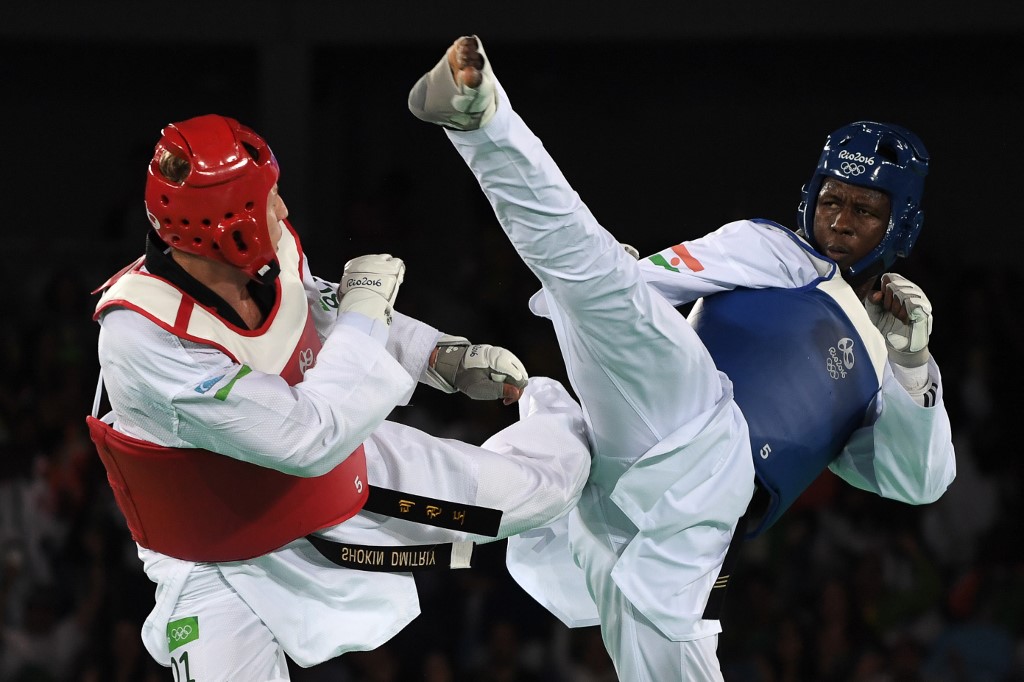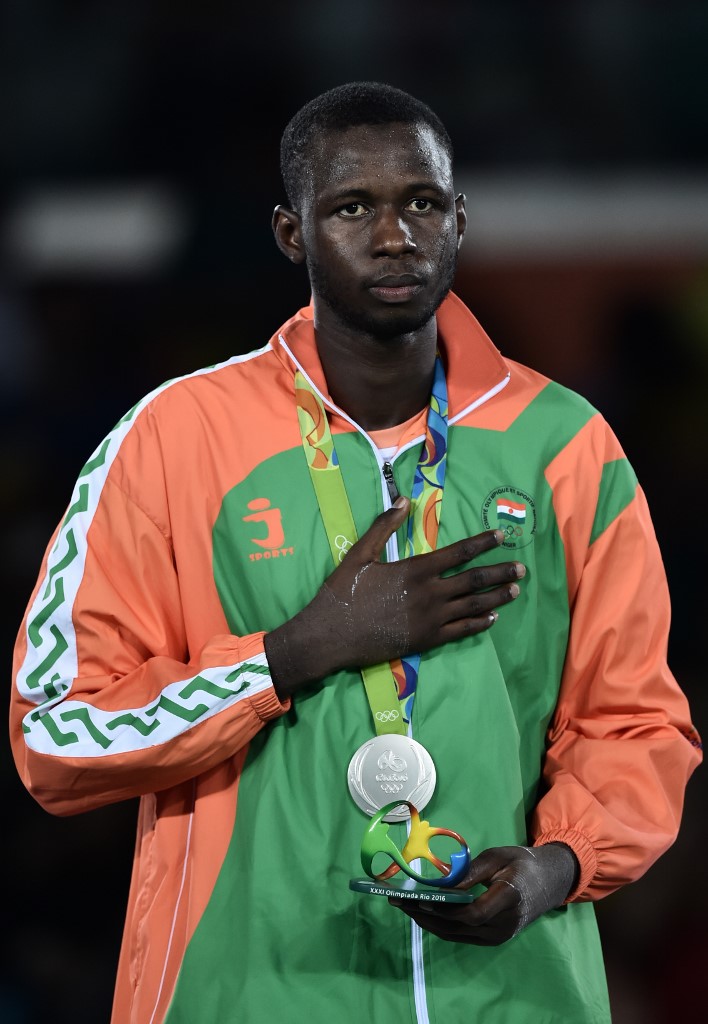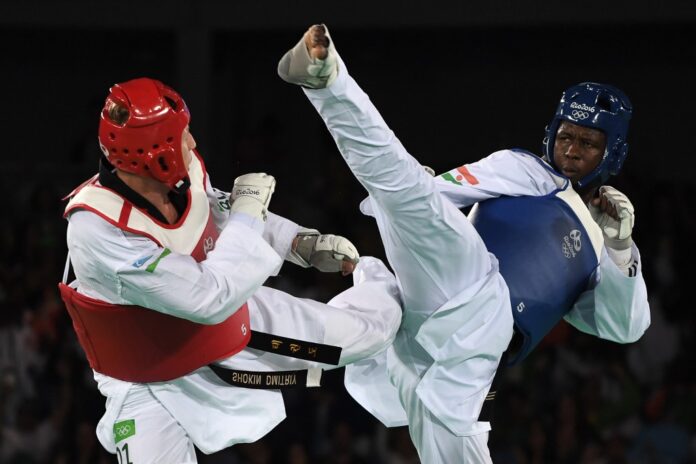
Abdoulrazak Alfaga had to practice taekwondo in secret when he started his sport. Now, at 26, he is a world champion, is idolised in Niger and is aiming to capture gold in Tokoyo. This is his story.
(video available here)
“When I won medals, I hid them so my mother wouldn’t see them,” Alfaga remembers. It would be hard to stop this athlete now. He stands 2.07m tall and weighs 98kg.
Growing up wasn’t easy –
Until the age of 16, Alfaga had to defy his parents’ ban on practicing taekwondo, a martial art of South Korean origin based on kicks and punches.
It was first of all his father who forbade him from practicing the sport following the death of a cousin of Alfaga’s, the victim of a heart attack after training.
However, Alfaga surreptitiously returned to taekwondo while staying in the neighbouring state of Benin, with an uncle.
“I took his children to taekwondo. As I often fought in the street, he found better that I do too, but on condition that it remained secret,” he explained, smiling.
Back in Niger, he still faced opposition from his mother, who maintained the ban on training even after the death of Alfaga’s father when he was just 12.
“She confiscated the doboks (the white outfit, editor’s note) that I bought in secret with my money”.
In 2011, things began to improve. “She learned that I was selected for the national team. A cousin pleaded my case. And she said ‘OK, but you have no right to make mistakes’.”
Alfaga’s mother wouldn’t live to experience his stardom, however. She died when he was just 17.
“When I won the silver medal in Rio, I thought of my parents. “They always trusted me and said that I will be successful in life.”
1.78 m at 13 years old –
Already 1.78 m tall at the age of 13, Alfaga flew through the ranks at regional youth competitions. He broke through on the international scene in 2012 and won gold at the 2015 African Games.
His performances earned him the support of the Nigerien state, which funded his training in Friedrichschafen, in southern Germany.
Initially aiming for the 2020 Tokyo Olympics, he burned through early qualifying and won his ticket for the 2016 Olympics by beating his idol, 2007 and 2009 world champion Malian Modibo Keita, in the qualifying tournament.
“Since 2012, I regularly sent him messages saying ‘I want to be like you.’ He would reply, ‘your height is lucky, but it takes more than that! Work! Work! Work!’. He has shown the way. Today, he still encourages me “, assures Alfaga.
Fighting in the over 80 kg tournament in Rio, after beating the French M’Bar N’Diaye and the Brazilian Maicon Siqueira, Alfaga created an upset in the semifinals by beating the Uzbek world No.1 Dmitry Shokin. But in the final against Azerbaijani Radik Isayev, he fell short, taking home the silver.
“I lost my focus. I was happy to have won the medal. A mistake, I was young”, he explained.

category as part of the Rio 2016 Olympic Games, on August 20, 2016, at the Carioca Arena 3, in Rio de Janeiro.
(Photo by Ed Jones / AFP)
He offered his country the second Olympic medal in its history, 50 years after an Olympic bronze medal was brought home by boxer Issaka Daboré from the 1972 Munich Olympics.
Triumphant welcome –
Abdoulrazak Alfaga was greeted as a hero in Niamey by thousands of people, including President Mahamadou Issoufou.
Now he is determined to deliver his country a gold Olympic medal.
“I want to win gold in Tokyo for the Nigerien people. I sacrifice myself, I train three times a day. There is a proverb here that says ‘suffer when you are young, otherwise, you will suffer when you are old’,”.
In 2017, he made good on his loss in Rio by becoming world champion at a contest in South Korea, the homeland of taekwondo.
“He’s tall, but what makes him the best is that he trains a lot,” said his compatriot Ismael Yacouba, also a resident of the German training center in Friedrichschafen.
Passing through Niamey at the end of 2020, Alfaga said he wanted to see his country become a world power in taekwondo.
He explained the success of taekwondo practitioners from African countries, such as Mali, Gabon and Ivory Coast and of another 2016 Olympic champion, Cheick Cissé, as the result of social customs – particularly traditional boxing and wrestling.
“In Africa, we fight in the street. You have to be the strongest. Even among children, anything is allowed. But I tell young people that you have to fight on the tatami and not in the street,” he said during a visit to one of the taekwondo schools that have flourished in the country.
At the school, some fifty children train with Tommy Gouzaye, who refereed many Alfaga fights in his youth.
“When I spoke to him, he bent down so as not to overtake me: respect and discipline, the keys to his success,” Gouzaye tells the delighted children who have lined up to exercise with the star.
“It’s ‘Alfa’, the great fighter, says Harouna Bihl, 8 years old. I would like to win like him”.
Story from AFP, rewritten and translated by SPNAfrica News.
SEE THE VIDEO STORY ON SPNAFRICA.COM



